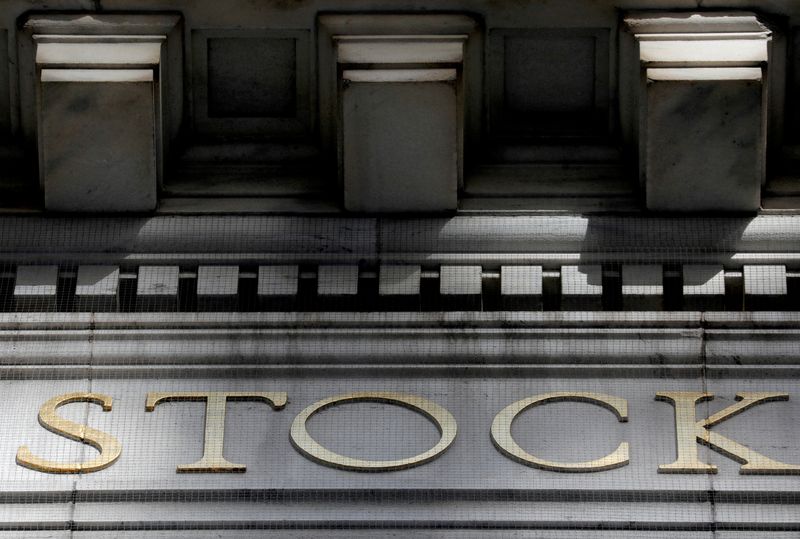By Naomi Rovnick
LONDON (Reuters) -Stock market investors are calling time on the idea that the Federal Reserve, and other major central banks, have their back.
Hopes for interest rate cuts by year-end have evaporated, given resilient data and sticky inflation, suggesting central banks will instead be inclined to keep borrowing costs around their highest since 2007 for some time.
The take away for money managers? Switch from so-called growth stocks, such as tech, and focus on businesses that can withstand the end of cheap funding -- banks that benefit from higher rates and resources and consumer staples businesses that can sell goods at prices that match inflation.
Companies that pay high dividends relative to their share prices, instead of investing in growth, are also favoured.
"For years, we've had a capitalist world that was highly dependent on central-banking policy and the 'Fed put'," said Gerry Fowler, head of European equity strategy at UBS, referring to the concept of central banks supporting financial markets any time economies turn lower.
"We are rapidly transitioning away from that."
VALUE IS BACK
European banking stocks, considered a deep value investment because of relatively low price-to-earnings ratios and higher dividend yields, have jumped 24% this year.
Global equity income funds had their first annual net inflows last year since 2014, according to Morningstar data, a trend that has continued into 2023.
Shares in tech firms, which dominate world equity markets and rely on cheap money to fund innovation, had a strong start to 2023 on hopes that aggressive rate hikes would soon end as the economic cycle decelerated.
The Nasdaq is still up about 12% year-to-date and a sub-index of European tech stocks has gained 15%. Still, these rallies lost steam from February with a build-up of strong U.S. jobs and consumer data and as euro zone inflation stayed high.
ALL CHANGE
With policymakers prioritising the inflation fight and money markets pricing U.S. rates moving above 5% this year, the door on rate cuts soon has been shut.
"We probably are not getting a (central bank) pivot," said Janus Henderson portfolio manager Robert Schramm-Fuchs. He added that he was buying shares in companies in mature industries left behind by the easy money-enforced tech bubble, such as miners and industrial suppliers.
"We're going back to what investing used to be," he said. "It is a good environment for stock-picking."
Neil Birrell, chief investment officer at UK asset manager Premier Miton, said his funds were adding to positions in energy companies and banks, among the clear winners of the last six months.
It's a contrast to recent years. In 2020 for instance, cheap money flooded into tech and other growth stocks, with rapid growth rates forecast far into the future, as interest rates were slashed to safeguard economies from pandemic-related shutdowns.
The Nasdaq soared 44% in 2020, its biggest annual surge since 2009.
NORMALITY BACK?
Exuberant market conditions and risk taking are being replaced by the more sober activity of scanning for undervalued firms that pay decent dividends.
A Reuters poll of 300 global asset managers last month showed 70% of those surveyed believed these so-called value stocks would outperform this year.
BlackRock (NYSE:BLK) Investment Institute, the research arm of the world's biggest asset manager, is also tipping value shares.
MSCI's value index, containing stocks with low price-to-book value and high dividend yields, has significantly underperformed its tech stock-dominated growth index since early 2020.
This value index is dominated by energy companies viewed as benefiting from China's economic reopening, banks that profit from higher rates and health care and household products businesses that could pass cost inflation on to the consumers of these basic goods.
In Europe, recent data showed company profit margins have been increasing alongside input costs.
"With the reopening of China and the stabilisation of the economy in Europe, that's enough for these kinds of stocks to work," Janus' Schramm-Fuchs said.
Another sign investors are turning towards value shares is the reduced premium they are paying for growth stocks.
The gap between the price-earnings multiple on MSCI's growth index, dominated by Apple (NASDAQ:AAPL) and Microsoft (NASDAQ:MSFT), and its value counterpart was its highest in a decade in December 2020. It has returned to pre-pandemic levels but remains elevated compared to the end of the Fed's last rate-rise cycle in early 2019.
"This convergence (between growth and value) should continue to be your base case," said Ryan Reardon, ETF strategist at State Street (NYSE:STT) Global Advisors. "Central banks will keep rates high."
